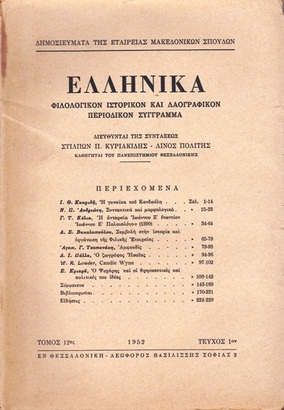«Πολίτευμα ευρωπαϊκόν» : Απόψεις για το πολίτευμα των Ελλήνων κατά τον Αγώνα (1821-1828)
Part of : Ελληνικά : φιλολογικό, ιστορικό και λαογραφικό περιοδικό σύγγραμμα ; Vol.49, No.2, 1999, pages 347-365
Issue:
Pages:
347-365
Parallel Title:
«A European Regime» : Views on the Government of the New Greek State in the War of Independence (1821-1828)
Author:
Abstract:
What was the appropriate regime for the Greek nation state at the time of its creation? One of the pious myths of modern Greece identifies the revolutionary regime with the first Greek republic, seeing in the liberal principles of the revolutionary constitutions proof of the alleged «democratic» character of the people. Others see in the experiences and pronouncements of insurgent Greece the «monarchical» character of the people. These alleged characteristics of the modern Greeks are among the inventions which modern Greeks can claim to be their own; they have been the frequent recourse of politicians as well as of intellectuals feeling the need to «prove» the roots of republicanism or monarchy in modern Greece, especially in times of political crisis. Contrary to such interpretations, this article aims to examine the political intentions of the insurgents and the formation of the revolutionary government in their historical context. As might be expected, the process of government - building was long and painful; the insecurity of life and property soon after the outbreak of hostilities, the inexperience of people in self-government, the powerful local interests, the conflicts between the various nuclei of established power, as well as the urgent need for the establishment of law and order, all of which were indispensable not only for the successful pursuit of the war, but also for winning the approval of Europe, all these determinants lead in the same direction: the establishment of a prudent regime and the concentration of authority preferably on one «able and virtuous man». In this respect, references to the need for a king or even a dictator are very common in the relevant sources. In spite of the varying references to the basic features of a fitting regime, there was a considerable consensus among those who were involved in forging a national government for the Greek state: it would have to be a representative government, preferably a constitutional monarchy, a regime fashioned on the model of European constitutional monarchies.
Subject:
Subject (LC):




